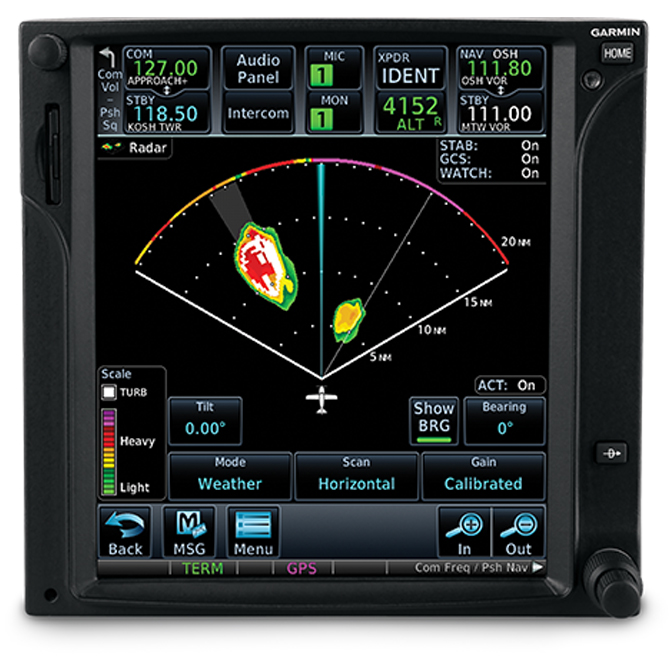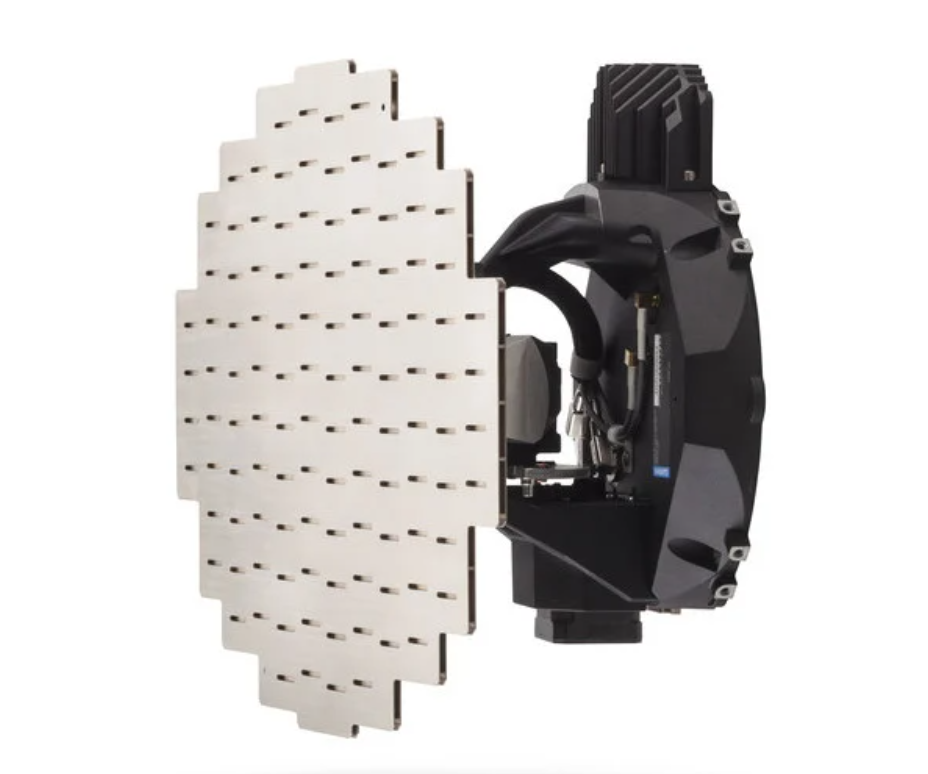GWX™ 75
Doppler-capable, Fully Stabilized Color Weather Radar
Doppler-capable, Fully Stabilized Color Weather Radar
- All-digital Garmin radar features high-definition color palette with up to 4 times more colors than traditional radars for more detailed contouring of storm cells
- Combines full antenna stabilization¹ with horizontal scan angles up to 120 degrees
- Optional Doppler-enabled turbulence detection and ground clutter suppression enable more precise weather interpretation
- Ground mapping mode provides a real-time depiction of geographical features to aid in visual navigation
- Fits a variety of aircraft radomes with 10" or 12" antenna sizes
Displaying more color intervals than traditional four-color radars, the Doppler-enabled GWX 75 radar helps take the guesswork out of real-time weather tracking and analysis. The additional colors provide a far more nuanced interpretation of storm cell dynamics. Plus, this high-definition target contouring combines with exceptional range and adjustable scanning profiles — both horizontal and vertical — to allow you to more accurately assess a storm threat via your compatible flight deck or multifunction display.
Scan with Doppler Accuracy
The fully stabilized GWX 75 offers horizontal scan angles up to 120 degrees to locate and evaluate convective weather activity. The radar’s vertical scanning mode aids in analyzing storm tops, gradients and cell buildups at various altitudes. In addition, our Weather Attenuated Color Highlight (WATCH®) technology helps identify the shadowing effects of short-range cell activity — highlighting areas where radar signals are weakened, or attenuated, by intense precipitation (or large areas of lesser precipitation) and may not fully reflect the “storm behind the storm.” With these capabilities, the GWX 75 radar makes it easier to scan large geographic areas and make sound weather-related decisions. Plus, a handy ground mapping mode lets you use GWX 75 to scan terrain features for visual navigation.

Less Clutter, More Clarity
To enhance the capabilities of GWX 75, available options include turbulence detection and ground clutter suppression. With ground clutter suppression, the GWX 75 radar provides a more consistent, more accurate view of weather at all altitudes and all ranges by identifying areas of ground and surface features. The result is a cleaner, clearer image that lets you focus on real weather. Likewise, optional turbulence detection technology can be used to determine areas of rough air — so you can make tactical routing decisions that avoid flying into hazardous conditions.
Count on Solid-state Reliability
With its digital design, the GWX 75 system offers reduced power consumption and extended service life, as compared to previous generations of magnetron-based radars. While magnetron tubes degrade or burn out over time, the solid-state technology in GWX 75 maintains a consistent weather picture over its entire life cycle — all while using only 40 W of transmission power. The weight-saving, all-in-one antenna/receiver/transmitter unit is available with 10” or 12” phased array antenna plates, so GWX 75 onboard radar capability can be adapted to a variety of aircraft radome configurations.
¹Antenna stabilization requires AHRS or gyro interface and is subject to mechanical limits of the radar
General
Operating Temperature Range: -55°C to +70°C.
Humidity: 95% non-condensing
Altitude Range: -1,500 ft to 55,000 ft
Input Voltage: 14/28 Vdc
Input Current: 2.5 A @ 28v, maximum
TSO Compliance: C63e, Class C
Environmental Compliance: RTCA/DO-160F
Physical
Width: 11.7 in (29.7 cm) max. diameter at base
Antenna: 10-Inch or 12-Inch in diameter flat plate
Depth (with antenna): 7.1 in (180 cm)
Weight:
- Unit with 10-Inch Antenna: 9.9 lb (4.52 kg)
- Unit with 12-Inch Antenna: 10.1 lb (4.59 kg)
Performance
Display Colors: 4 Colors or Enhanced Color Palette
Selectable Ranges: 2.5, 5, 10, 20, 40, 60, 80, 100, 120, 160, 200, 240, and 320nm
Weather Avoidance Range:
- 10-Inch Antenna: 285 nm max
- 12-Inch Antenna: 320 nm max
Performance Index:
- 10-Inch Antenna: 218 dB
- 12-Inch Antenna: 221 dB
Tx Frequency: 9300 MHz to 9500 MHz
Rx Sensitivity: -130 dBm MDS
Manual Gain: +12dB to -28dB
Antenna Beamwidth:
- 10-Inch Antenna: 9.6 degrees
- 12-Inch Antenna: 7.9 degrees
Peak Power: 40 W nominal, 36 W minimum
Horizontal Scan Angle: 20, 40, 60, 90, or 120 degrees (Pilot adjustable)
Vertical Scan Angle: 60 degrees
Scan Centerline: Pilot adjustable
Horizontal Scan Rate: 12 looks/minute
Vertical Scan Rate: 24 looks/minute
Manual Tilt: +/- 15 degrees
Sensitivity Timing Control (STC): At all ranges

